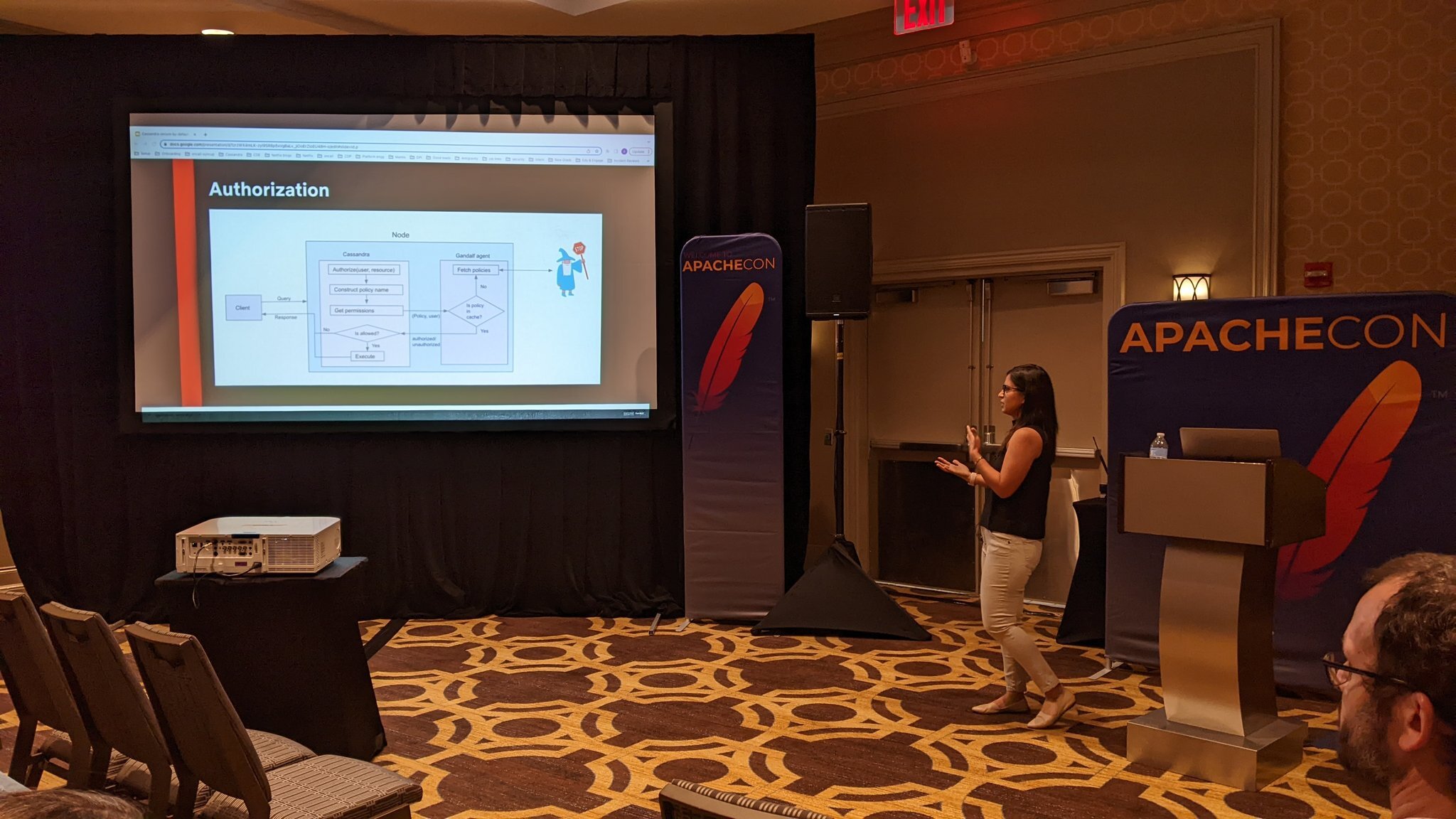
Release Notes
The first beta version of Apache Cassandra 4.1 (4.1-beta1) has been released. This is another milestone that brings us closer to the next major release of Cassandra.
Please read the release notes and feed back any problems you encounter.
In the interim, the latest release of Apache Cassandra is 4.0.7(pgp, sha256, sha512), which was announced on 23 October 2022.
Please read the 4.0.7 release notes and let us know if you encounter any problems.
The other latest supported releases are Apache Cassandra 3.11.14 (pgp, sha256, sha512) and 3.0.28 (pgp, sha256, sha512), which were both released on 23 October 2022.
Please read the 3.11.14 and 3.0.28 release notes and contact us if you experience any issues.
Note: For this release cycle only, we will continue to support Cassandra 3.0. as well as the latest patch versions of 3.11 and 4.0. See Behind the Scenes of an Apache Cassandra Release for more details.
See the download section for the latest stable and older supported versions of source and binary distributions. Please make sure you read the additional information on the Download page as the Debian and RedHat package repositories have moved.
To stay up-to-date, we recommend joining the Cassandra mailing lists.
Community Notes for October
Updates on Cassandra Enhancement Proposals (CEPs), how to contribute, and other community activities.
For newcomers to the project, we have a useful ‘Contributing to Cassandra’ page for how to get involved and get started. We would also recommend reading the overview of the C* architecture.
We use Jira to record project issues. Here’s a handy Jira tip from Josh McKenzie, if you want to search for tickets in your area of interest, use this URL link. Simply swap out ‘ReplaceTextHere’ in the URL query string for what you want to find.
We also recommend viewing two Jira ticket queries we’ve created. One is a list of unassigned tickets for 4.0.x or 4.x, covering things like documentation contributions and website contributions. The other is our list of ‘Starter Tickets’ for 4.0.x and 4.1.x. These are tickets that have been determined by a mentor as being more manageable and good for getting to know the project. If you want to find a more challenging ticket just remove the ‘Start Tickets’ filter and dive in!
Just remember to assign yourself to the ticket and acknowledge the status, such as ‘Work in Progress’ and ‘Needs Comitter/Patch Available’ when you submit your patch. You can also reach out on the ASF Slack in the #cassandra-dev Slack channel. We have 13 mentors ready to help, and you can contact them by using @cassandra_mentors.
Note: We’ve become aware that ASF Slack has been made more secure to prevent excessive spam. To join the ASF Slack, you will need to send a message on the Cassandra mailing list so we can send you an invite.
You can also read PMC member Josh McKenzie’s latest bi-weekly update for ongoing discussions and the latest on ticket progress.
Announced
We are pleased to announce that the Cassandra Summit will return in 2023. You can read the blog post for more details. The event will be held in San Jose, California on March 13-14 and hosted by the Linux Foundation. Call for Proposals are now open and you can read a guide on what is required on the official event site here. If you would like to be a sponsor of this event, please email sponsorships@linuxfoundation.org.
Announced
There weren’t official recordings at ApacheCon NA this year, but Jeremy Hanna has kindly supplied footage that he took of many of the Cassandra track presentations. Many of the talks were ground-breaking, so we are currently collecting slides and looking at recording the presentations again to enable us to upload them to YouTube.

Announced
A new episode of Apache Cassandra Corner has been released! Episode 11 is an interview with PMC Chair, Mick Semb Weaver and his journey into open source, life at The Last Pickle and what’s involved in being the PMC Chair. Host, Aaron Ploetz has announced that the next episode will be with Derek Chen-Becker, AWS Senior Engineer and open source developer.
Announced
Thanks to Stefano Lottini, we have added a dedicated Events page to the Cassandra website. As you may have noticed, Cassandra Summit has returned and we have frequent city-based Cassandra Days in the calendar now. This has meant we needed a special page to promote events away from the technical focus of the Cassandra blog.
Discussed
Derek Chen-Becker has opened a discussion refactoring the CircleCI configuration and bringing it to parity with Jenkins. If you want to help or contribute to the discussion, you can find the mailing list thread here.
Discussed
Josh McKenzie started a discussion on revising the release gating criteria and CI systems. The conclusion of that conversation was a vote that was passed, allowing either ASF Jenkins or CircleCI as release gating criteria for official Cassandra releases. This is an interim measure while the project continues work to improve the stability of the ASF CI infrastructure.
Discussed
Mick Semb Wever has been leading a discussion on making release 4.2 into 5.0. This has been agreed by consensus. The thread has been discussing the distinctions between majors and minors and whether or not they are required.
Discussed
The discussion on CEP-24: Password validation and generation, started by Stefan Miklosovic, has progressed to cover what operators to use and the industry standards. You can add to the discussion on the mailing list.
Discussed
The conversation, led by Branimir Lambov, on including the Agrona library, which is dependency of the new Trie memtable implementation, has reached a consensus. While the Agrona library will be included, it did lead to a discussion on the dangers of overlapping functionality and the need to document the Cassandra way to approach adding dependencies to the code-base where you have multiple first-class options. You can follow the discussion here.
Discussed
Brad Schoening is continuing to help us modernize CQLSH and our use of Python. This time to bring awareness to an upgrade from optparse to argparse to remove dependencies on deprecated classes and components, which was quickly approved.
Discussed
Berenguer Blasi is looking for feedback on CASSANDRA-14227 on extending the maximum expiration timestamp date that can be represented by the storage engine. If you have a perspective on this, join the discussion thread here or chime in directly into the ticket.
User Space
Capital One
Senior Director at Capital One, David Harmony, explaining why the American bank holding company uses Apache Cassandra:
“One of the bigger advantages of Cassandra is resilience. Since Cassandra leans towards AP in CAP Theorem, it can manage partition failures to remain available round-the-clock. Cassandra’s masterless, peer-to-peer architecture ensures that applications never experience downtime even during disastrous system failures.”
Do you have a Cassandra case study to share? Email cassandra@constantia.io.
Cassandra Articles
Solutions Review The 15 Best Open-Source Data Engineering Tools for 2022
On the Blog
Cassandra Days Asia - Hanoi, Jakarta, Singapore - Erick Ramirez
Cassandra Day Santa Clara-Bellevue-Houston + Wakanda Forever - Erick Ramirez
Cassandra Summit Returns in 2023 - Cassandra Community
Apache Cassandra Changelog #19 - Chris Thornett
Learn How CommitLog Works in Apache Cassandra - Alex Sorokoumov
Cassandra Day in Berlin Announced - Cassandra Community
Apache Cassandra Changelog #17 - Cassandra Community
Apache Cassandra Changelog #18 - Chris Thornett














